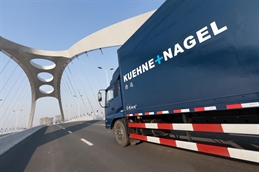
The Kuehne+Nagel Group said it "clearly exceeded" the 10-year sustainability targets it set in 2010 and the company is now ready to roll out its plan for the next decade.
"The KN Green environmental programme initiated in 2010 was completed at the end of last year. All targets were reached or exceeded," the Swiss transport and logistics firm said.
It noted that over the last ten years, Kuehne+Nagel was able to reduce the CO2 emissions of its own locations by 27%. The share of renewable energies in total electricity consumption was also 18% and the recycling rate over the ten-year average was 77%.
By the end of 2019, Kuehne+Nagel said the area equipped with LED lighting technology corresponded to around 3.8 million sqm.
"Sustainability is a social responsibility and is the duty of every individual. Following the successful completion of our environmental goals set ten years ago, we are now starting the next phase of our sustainability strategy. With our Net Zero Carbon programme, we are taking responsibility for sustainable logistics, hand in hand with our customers and partners," said Dr. Detlef Trefzger, CEO of Kuehne+Nagel International AG.
The company has recently published its Sustainable Report 2019 as it sets out its performance in the areas of environment, social and governance (ESG). The report follows the structure of the Global Reporting Initiative as well as the 17 goals for sustainable development of the United Nations.
With "Net Zero Carbon," said Kuehne+Nagel has launched a sustainability programme for the next ten years.
"Kuehne+Nagel is playing a pioneering role in the logistics industry with this programme. By the end of 2020, the company's own CO2 emissions (Scopes 1 and 2 of the greenhouse gas protocol) will be neutral; by 2030, this will be extended to all transport by suppliers such as airlines, shipping lines and haulage companies (Scope 3)," it added.
Net Zero Carbon leverages three fields of action: detection, reduction and compensation of CO2.



